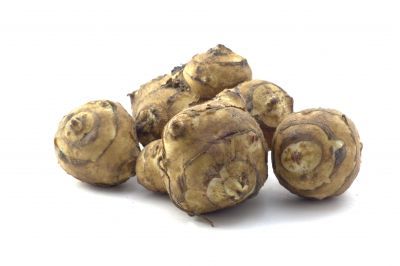Another reason for foodies and vegetarians to get pumped about sunchokes

Sunchokes, also known as Jerusalem artichokes, have recently become a mainstay in modern gourmet cuisine. Sunchokes are also surprisingly high in iron, touts numerous health sites.
Unless you are anemic, most physicians and nutritionists recommend eating food to get your iron instead of taking supplements. The US Office of Dietary Supplements (ODS) recommends 8 mg of iron daily for males and 18 mg for females.
According to Fitsugar.com, an online health resource, if you are feeling "sleepy, run down, dizzy, low in energy, short of breath, having a hard time focusing at work, noticed that your skin is pale or you often have headaches," then you could be deficient in iron.
Planet Green, an online magazine from the Discovery family, states one cup of sunchokes can allot for 30 percent of daily-recommended iron intake.
Livestrong.com, a companion site to Lance Armstrong foundation Livestrong.org, describes additional benefits of the sunchoke, "sunchokes are high in iron, calcium, riboflavin, vitamin B6, vitamin C and phosphorous."
Since meat is a prime source of iron, many vegetarians can become anemic or very low in iron.
Try adding sunchokes to your diet and more of these foods: fortified cereal, dried apricot, raisins, molasses, legumes (garbanzo, pinto, lima, soybeans, lentils), tofu, sun-dried tomatoes, spinach, kale, broccoli, asparagus, potatoes, nuts and seeds (pine nuts, peanuts, pumpkin, sunflower, flaxseed.
For non-vegetarians eggs, turkey (dark meat), oysters, trout and shrimp are additional sources.
Join our commenting forum
Join thought-provoking conversations, follow other Independent readers and see their replies
Comments